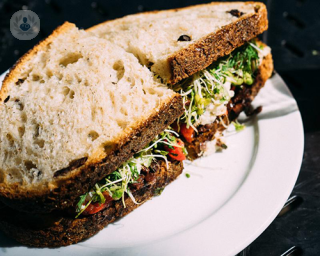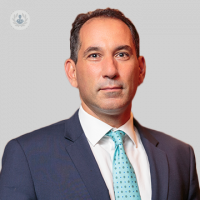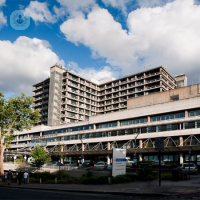What is coeliac disease?
Coeliac disease is a pathology characterised by permanent intolerance to gluten. This substance is present in wheat, barley, rye and oats. Gluten damages the lining of the small intestine, causing it not to absorb the necessary components of the food, i.e nutrients. It occurs in genetically predisposed individuals who suffer from atrophy of the villi of the small intestine.
The disease can manifest itself at any time of life, from infancy to adulthood. People with family members who suffer from coeliac disease have a greater predisposition to suffer from it. It occurs more often in women than in men.
What are the symptoms?
Depending on the degree of intolerance, there may be only a few symptoms which present, or a great many. It is also possible that no symptoms present.
The most common manifestations of coeliac disease are:
- abdominal pain
- gas
- indigestion
- constipation
- decreased or increased appetite
- diarrhoea
- nausea or vomiting
- unexplained weight loss.
Other problems may also occur such as being more prone to bruising, depression, anxiety, fatigue, delayed growth in children, hair loss, dermatitis, mouth ulcers, nosebleeds, and muscle cramps, and absence of menstrual periods, among others.
Causes of coeliac disease
The exact cause of coeliac disease is unknown. When people with coeliac disease consume foods with gluten, whether or not they are aware of their disease, their immune system causes damage to the villi in the small intestine. This in turn makes the small intestine unable to adequately absorb iron, vitamins and nutrients.
Can it be prevented?
As the cause of coeliac disease is not known, there is no way to prevent its appearance. However, it is important to take into account certain risk factors such as having a family member with this disorder, for early diagnosis and treatment.
What is the treatment?
Coeliac disease cannot be cured. The treatment is to follow a gluten-free diet for life. This helps the symptoms disappear and to heal the villi in the lining of the intestines.
If adequate treatment is not given, certain complications can occur such as autoimmune disorders, bone disease, intestinal cancer, anaemia, or liver disease.
11-13-2012 05-26-2023Coeliac disease
Dr Carlo Nunes - Gastroenterology
Created on: 11-13-2012
Updated on: 05-26-2023
Edited by: Conor Dunworth
What is coeliac disease?
Coeliac disease is a pathology characterised by permanent intolerance to gluten. This substance is present in wheat, barley, rye and oats. Gluten damages the lining of the small intestine, causing it not to absorb the necessary components of the food, i.e nutrients. It occurs in genetically predisposed individuals who suffer from atrophy of the villi of the small intestine.
The disease can manifest itself at any time of life, from infancy to adulthood. People with family members who suffer from coeliac disease have a greater predisposition to suffer from it. It occurs more often in women than in men.
What are the symptoms?
Depending on the degree of intolerance, there may be only a few symptoms which present, or a great many. It is also possible that no symptoms present.
The most common manifestations of coeliac disease are:
- abdominal pain
- gas
- indigestion
- constipation
- decreased or increased appetite
- diarrhoea
- nausea or vomiting
- unexplained weight loss.
Other problems may also occur such as being more prone to bruising, depression, anxiety, fatigue, delayed growth in children, hair loss, dermatitis, mouth ulcers, nosebleeds, and muscle cramps, and absence of menstrual periods, among others.
Causes of coeliac disease
The exact cause of coeliac disease is unknown. When people with coeliac disease consume foods with gluten, whether or not they are aware of their disease, their immune system causes damage to the villi in the small intestine. This in turn makes the small intestine unable to adequately absorb iron, vitamins and nutrients.
Can it be prevented?
As the cause of coeliac disease is not known, there is no way to prevent its appearance. However, it is important to take into account certain risk factors such as having a family member with this disorder, for early diagnosis and treatment.
What is the treatment?
Coeliac disease cannot be cured. The treatment is to follow a gluten-free diet for life. This helps the symptoms disappear and to heal the villi in the lining of the intestines.
If adequate treatment is not given, certain complications can occur such as autoimmune disorders, bone disease, intestinal cancer, anaemia, or liver disease.


A guide to coeliac disease in children: causes, diagnosis and treatment
By Dr Assad Butt
2024-12-20
Coeliac disease is caused by an abnormal immune system reaction to gluten, a protein found in bread, pasta, cereals, etc. If your child has coeliac disease and they ingest gluten, their immune system detects this as harmful to the body and causes inflammation and damage to their intestine. Dr Assad Butt, one of our top paediatric gastroenterologists, guides us through the causes and diagnosis of coeliac disease and how it can be treated. See more


Iron deficiency without anaemia in children
By Dr Margarita Burmester
2024-12-20
Iron deficiency is a condition commonly associated with anaemia. However, it’s important to establish that there's a difference between iron-deficiency anaemia and iron deficiency without anaemia. Leading consultant paediatric specialist Dr Margarita Burmester tells us all about iron deficiency without anaemia in children. She looks at the causes, signs and symptoms, and more, in this informative article. See more


Who really needs to eat gluten-free?
By Dr Aathavan Loganayagam
2024-12-20
It seems that gluten has developed a bad reputation these days, with many of us opting for gluten-free alternatives and cutting out a key part of our diet altogether. But does everyone really need to eat this way? Top gastroenterologist Dr Aathavan Loganayagam is here to explain the symptoms of the medical conditions that may require some people to eat a gluten-free diet. See more


IBS symptoms: could they mean something else?
By Dr Lisa Das
2024-12-20
Symptoms aren't always what they seem. Leading consultant gastroenterologist Dr Lisa Das tells us about 4 other conditions to watch out for that share the same symptoms as irritable bowel syndrome. See more
Experts in Coeliac disease
-
Professor Christos Toumpanakis
GastroenterologyExpert in:
- Neuroendocrine tumours
- Acid reflux
- Inflammatory bowel disease (IBD)
- Chronic diarrhoea
- Coeliac disease
- Dysphagia
-
Dr Mark Cox
GastroenterologyExpert in:
- Irritable bowel syndrome (IBS)
- Inflammatory bowel disease (IBD)
- Coeliac disease
- Endoscopy
- ERCP
- Liver disease
-
Dr Farooq Rahman
GastroenterologyExpert in:
- Inflammatory bowel disease (IBD)
- Crohn's disease
- Ulcerative colitis
- Irritable bowel syndrome (IBS)
- Colonoscopy
- Coeliac disease
-
Dr Derek Chan
GastroenterologyExpert in:
- Acid reflux
- Inflammatory bowel disease (IBD)
- Abdominal pain
- Irritable bowel syndrome (IBS)
- Coeliac disease
- Crohn's disease
-
Dr Dhamyanthi Thangarajah
Paediatric gastroenterologyExpert in:
- Endoscopy
- Acid reflux
- Infant feeding
- Abdominal pain
- Coeliac disease
- Food allergies
- See all

The Royal Free Hospital
The Royal Free Hospital
Pond Street, Hampstead. NW3 2QG
No existe teléfono en el centro.
By using the telephone number provided by TOP DOCTORS, you automatically agree to let us use your phone number for statistical and commercial purposes. For further information, read our Privacy Policy
Top Doctors

House of Health
House of Health
90 Pope St, Birmingham B1 3BH
No existe teléfono en el centro.
By using the telephone number provided by TOP DOCTORS, you automatically agree to let us use your phone number for statistical and commercial purposes. For further information, read our Privacy Policy
Top Doctors

GI DOCTORS
GI DOCTORS
116 Harley Street, Marylebone, W1G 7JL
No existe teléfono en el centro.
By using the telephone number provided by TOP DOCTORS, you automatically agree to let us use your phone number for statistical and commercial purposes. For further information, read our Privacy Policy
Top Doctors
-
The Royal Free Hospital
Pond Street, Hampstead. NW3 2QG, Central LondonExpert in:
- General Surgery
- Orthopaedic surgery
- Robotic Surgery
- Dermatology
- Obstetrics and Gynaecology
- Paediatrics
-
House of Health
90 Pope St, Birmingham B1 3BH, BirminghamExpert in:
- Anxiety
- Plastic surgery, reconstructive and aesthetics
- Obstetrics and Gynaecology
- Women’s health
- Menopause
- Sexual health
-
GI DOCTORS
116 Harley Street, Marylebone, W1G 7JL, W1G Marylebone LondonExpert in:
- Colorectal surgery
- Colonoscopy
- Inflammatory bowel disease
- Gastroenterology
- Hernia
- Irritable bowel syndrome
- See all
- Most viewed diseases, medical tests, and treatments
- Alzheimer's disease
- Child nutrition
- Migraine
- Paediatric rheumatology
- Autoimmune diseases
- Joint pain
- Nutrition
- Weight loss injections
- Endermologie
- Genetic testing









